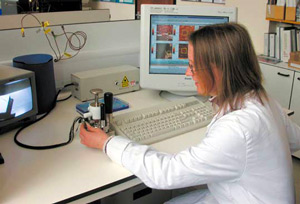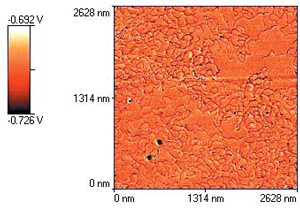| 2005 |

|
YEAR BOOK |
The Open University in Ireland
|
Exploring the Molecular World – new insights with The Open University
|
The way we currently live our lives is heavily reliant on chemistry – from the use of new drugs, to maintaining food standards, monitoring pollution, improving power sources or developing eco-friendly materials – understanding how different materials and molecules react is fundamental.
At the Open University, strong bonds between research and teaching have created a range of innovative distance-learning chemistry courses that provide opportunities to study at an introductory to advanced level, while simultaneously benefiting from practical work in virtual and face-to-face settings. Some of the key OU Chemistry research areas feeding into teaching include Bio-organic and Medicinal Chemistry headed by Prof. David Shuker, Materials Chemistry lead by Prof. Frank Berry, Organosilicon Chemistry lead by Prof. Alan Bassindale and Co-ordination Chemistry lead by Dr Charles Harding.
Links between DNA, Cancer and Food Science
Understanding how damage to and modification of DNA affects our health is of major concern. As part of an international panel of specialists, Prof. David Shuker has been involved in preparing a major report on "Diet, Nutrition, Physical Activity and Cancer" that will underpin national government and World Health Organisation (WHO) policies on lowering cancer risks through dietary interventions. In a second project (sponsored by the World Cancer Research Fund) investigating links between food components, DNA damage and cancer, Dr Sharon Moore and co-workers have developed a highly sensitive test capable of detecting a single modified base within 100 million normal bases in DNA from blood or tissues. This approach, using atomic force microscopy (AFM), significantly enhances current DNA damage detection abilities.

Improving performance in Materials Chemistry
By matching current performance to the fundamental properties of materials such as magnets, catalysts, pigments and ceramics, the Materials Chemistry Group has been using various laboratory techniques along with nuclear magnetic resonance (NMR), electron paramagnetic resonance (EPR), Mossbauer spectroscopy and thermal analysis, to characterise their structural properties, and so manipulate and optimise future potential performance levels.
Raising public awareness of Chemistry – outreach programmes for schools and colleges
The Wellcome Trust recently awarded the Department £180,000 to further enhance public interest in chemistry. This is being done through initiatives such as the OU popular Science TV programme Rough Science, and to develop multimedia and hands-on materials for use at science fairs and workshops, like the widening participation events at Waterford Institute of Technology, where OU Chemists James Bruce and Rob Janes demonstrated the practical side of Chemistry to local school pupils.
Studying Molecular Science
The range of undergraduate and postgraduate courses collectively reflects the breadth of contemporary chemistry from core chemistry to medical and biological chemistry, environmental science and materials. At the centre of the undergraduate programme is The Molecular World, co-published with the Royal Society of Chemistry. This course uses an integrated approach to link major themes and concepts in organic, inorganic and physical chemistry to the natural world, and uses case studies from acknowledged experts to illustrate the importance of chemistry in industry and areas of social and scientific interest. Its interactive DVDs and innovative approach have been internationally acclaimed. Within the postgraduate programme, Molecules in Medicine has recently been in the international news due to one of its students, Gary Smith, devising a hypothesis that could have major impacts on virtually all inflammatory diseases such as Alzheimer's, Parkinson's and arthritis, the results of which have since been published in the Journal of Inflammation.
Over the past six years, the number of students studying chemistry or chemistry-based courses at the OU has almost doubled to just over 2,000 each year. In the recent UK Teaching Quality Assessments, the Department was rated as excellent (one of only 12 of the 72 assessed chemistry departments in England to reach this standard), while in 2000, a member of the Department was awarded a prestigious Royal Society of Chemistry Higher Education Teaching Award.

Studying with the OU – a route to continual development and new opportunities
Studying with the OU provides a flexible and effective method to pursue and maintain continuing professional development. Many of the Open University's courses, diplomas and degrees can be used to fulfil the academic requirement needed for membership of a range of professional institutes. There are no entry requirements for our undergraduate courses, but you must have a first degree if you want to study at postgraduate level. The courses described above are part of a wider range of science courses offered by the OU in Geosciences, Life Sciences, Molecular Science, Natural Science and Physical Sciences.
For further information on studying or teaching with the OU, please contact: Dr Arlëne Hunter:
The Open University in Ireland,
40 University Road, Belfast, BT7 1SU; Tel: 028 (048 from RoI) 9024 5025;
E-mail [email protected] Website: www.open.ac.uk/science